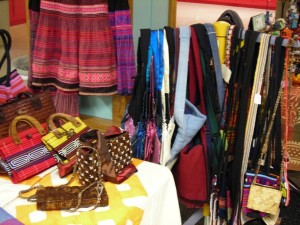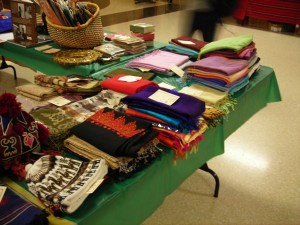
Students can run their hands over textured silk scarves, browse through displays of intricately beaded jewelry and examine handmade cards at the 12th annual Holiday Fair Trade Sale that features one-of-a-kind gifts from all over the world.
“I got a cool ring here last year,” junior Meghan Durkin said. “Now I’m looking for a gift for my mom.”
But the gift recipient isn’t the only person who benefits from these unique gifts.
Purchasing these gifts also helps people living in poverty in various countries around the world. Every item at the sale was purchased from the original artist, worker or farmer at what is considered a fair price. According to senior Taylor Acker, one of the sale’s organizers, many people in poor countries don’t receive enough money for their work so Fair Trade is one way to tilt the balance in the artisans’ and workers’ favor.
How Fair Trade works
“Fair Trade vendors pay fair wages all the way through the purchasing process,” Acker said. “So with coffee, for example, the buyers pay fair wages to all the different people who grow, pick and transport the beans. It’s an ethical way of doing business.”
Fair Trade companies also eliminate the “middle man” in purchases, according to sale organizer Erin Hagen.
“The artists or workers can then negotiate directly with the buyers so they get a say in how much they’re going to sell their products for,” junior Hagen said. “They get a better price, have more say in where their product goes and it gives them more power in the business relationship.”
Hagen also said that the Fair Trade method of doing business supports communities living in poverty and teaches those communities how to advocate for fair wages.
Alsadu, a Minneapolis-based Fair Trade company, was featured at the sale selling a variety of handicrafts made by refugees from around the world.

“We’re helping these refugees survive and thrive,” Alsadu sales representative Loretta Novak said. “It’s delightful to see the beautiful things they come up with and how their sense of art is so different than ours.”
Another Fair Trade company at the sale, Coat of Many Colors, has had a store on Grand Avenue for 30 years.
“We give 20 percent of our profits back to various Third World organizations,” said Coat of Many Colors owner Mabel Nichols.
Acker: Follow Catholic social justice teachings – buy Fair Trade
According to Acker, buying Fair Trade products is one way to follow the teachings of Catholic social justice.
“When you buy Fair Trade, you are valuing the poor, giving workers dignity and showing solidarity with people in other parts of the world,” Acker said. “Holiday shopping has become the American way, so why not shop in a way that will be friendlier for the world?”
The Campus Square in the lower level of Murray-Herrick Center is the site for the sale as it kicked off Wednesday and ends Thursday at 4:30 p.m. The Fair Trade sale is run by the Students for Justice and Peace club and the organizers hope the sale will educate the St. Thomas community about the importance of buying Fair Trade products.
“This way students can feel really good about the gifts they’re giving,” Acker said. “We hope it [the sale] gives everyone at St. Thomas an appreciation for Fair Trade and global crafts.”
Katie Broadwell can be reached at klbroadwell@stthomas.edu

I think it’s great St. Thomas is promoting fair trade! I’m definitely going to check out the scarves!